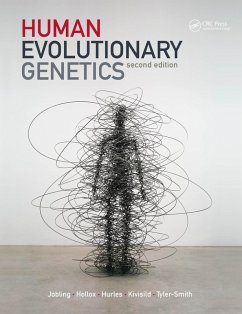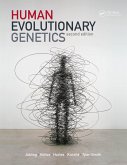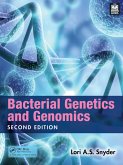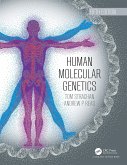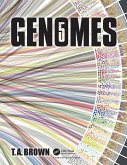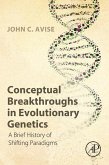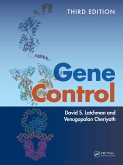Mark Jobling, Edward Hollox, Toomas Kivisild, Chris Tyler-Smith
Human Evolutionary Genetics (eBook, ePUB)
88,95 €
88,95 €
inkl. MwSt.
Sofort per Download lieferbar

44 °P sammeln
88,95 €
Als Download kaufen

88,95 €
inkl. MwSt.
Sofort per Download lieferbar

44 °P sammeln
Jetzt verschenken
Alle Infos zum eBook verschenken
88,95 €
inkl. MwSt.
Sofort per Download lieferbar
Alle Infos zum eBook verschenken

44 °P sammeln
Mark Jobling, Edward Hollox, Toomas Kivisild, Chris Tyler-Smith
Human Evolutionary Genetics (eBook, ePUB)
- Format: ePub
- Merkliste
- Auf die Merkliste
- Bewerten Bewerten
- Teilen
- Produkt teilen
- Produkterinnerung
- Produkterinnerung

Bitte loggen Sie sich zunächst in Ihr Kundenkonto ein oder registrieren Sie sich bei
bücher.de, um das eBook-Abo tolino select nutzen zu können.
Hier können Sie sich einloggen
Hier können Sie sich einloggen
Sie sind bereits eingeloggt. Klicken Sie auf 2. tolino select Abo, um fortzufahren.

Bitte loggen Sie sich zunächst in Ihr Kundenkonto ein oder registrieren Sie sich bei bücher.de, um das eBook-Abo tolino select nutzen zu können.
Human Evolutionary Genetics is a revolutionary textbook which combines the study of genetics, anthropology and forensics to provide an understanding of human evolution and population histories.
- Geräte: eReader
- ohne Kopierschutz
- eBook Hilfe
- Größe: 102.33MB
Andere Kunden interessierten sich auch für
![Human Evolutionary Genetics (eBook, PDF) Human Evolutionary Genetics (eBook, PDF)]() Mark JoblingHuman Evolutionary Genetics (eBook, PDF)88,95 €
Mark JoblingHuman Evolutionary Genetics (eBook, PDF)88,95 €![Bacterial Genetics and Genomics (eBook, ePUB) Bacterial Genetics and Genomics (eBook, ePUB)]() Lori SnyderBacterial Genetics and Genomics (eBook, ePUB)54,95 €
Lori SnyderBacterial Genetics and Genomics (eBook, ePUB)54,95 €![Human Molecular Genetics (eBook, ePUB) Human Molecular Genetics (eBook, ePUB)]() Tom StrachanHuman Molecular Genetics (eBook, ePUB)79,95 €
Tom StrachanHuman Molecular Genetics (eBook, ePUB)79,95 €![Genomes 5 (eBook, ePUB) Genomes 5 (eBook, ePUB)]() Terry A. BrownGenomes 5 (eBook, ePUB)69,95 €
Terry A. BrownGenomes 5 (eBook, ePUB)69,95 €![Conceptual Breakthroughs in Evolutionary Genetics (eBook, ePUB) Conceptual Breakthroughs in Evolutionary Genetics (eBook, ePUB)]() John C. AviseConceptual Breakthroughs in Evolutionary Genetics (eBook, ePUB)18,95 €
John C. AviseConceptual Breakthroughs in Evolutionary Genetics (eBook, ePUB)18,95 €![Gene Control (eBook, ePUB) Gene Control (eBook, ePUB)]() David S. LatchmanGene Control (eBook, ePUB)91,95 €
David S. LatchmanGene Control (eBook, ePUB)91,95 €![From Chromosomes to Mobile Genetic Elements (eBook, ePUB) From Chromosomes to Mobile Genetic Elements (eBook, ePUB)]() Lee B. KassFrom Chromosomes to Mobile Genetic Elements (eBook, ePUB)52,95 €
Lee B. KassFrom Chromosomes to Mobile Genetic Elements (eBook, ePUB)52,95 €-
-
-
Human Evolutionary Genetics is a revolutionary textbook which combines the study of genetics, anthropology and forensics to provide an understanding of human evolution and population histories.
Dieser Download kann aus rechtlichen Gründen nur mit Rechnungsadresse in A, B, BG, CY, CZ, D, DK, EW, E, FIN, F, GR, HR, H, IRL, I, LT, L, LR, M, NL, PL, P, R, S, SLO, SK ausgeliefert werden.
Produktdetails
- Produktdetails
- Verlag: Taylor & Francis eBooks
- Seitenzahl: 650
- Erscheinungstermin: 25. Juni 2013
- Englisch
- ISBN-13: 9781317952251
- Artikelnr.: 68440428
- Verlag: Taylor & Francis eBooks
- Seitenzahl: 650
- Erscheinungstermin: 25. Juni 2013
- Englisch
- ISBN-13: 9781317952251
- Artikelnr.: 68440428
- Herstellerkennzeichnung Die Herstellerinformationen sind derzeit nicht verfügbar.
Mark Jobling
earned a degree in Biochemistry and a DPhil at the University of Oxford, UK, and in 1992 came to the University of Leicester, UK, where he is now a Wellcome Trust Senior Fellow in Basic Biomedical Sciences and Reader in Genetics. Mark's interests are in Y chromosome diversity as a tool for addressing questions in human evolution, genealogy and forensics, and also male infertility and haploid mutation processes.
Matthew Hurles
earned his degree in biochemistry at Oxford University, UK, and PhD in Leicester, UK. He was until recently a Research Fellow at the McDonald Institute for Archaeological Research at Cambridge University, UK, analyzing genetic variation with the aim of improving our understanding of the human past. He is now at the Wellcome Trust Sanger Institute near Cambridge, UK, investigating the unusual evolutionary dynamics of recently duplicated genomic regions.
Chris Tyler-Smith
earned his degree in biochemistry at Oxford University, UK, and PhD in Edinburgh, UK. For the last few years he has been a University Research Lecturer in the Biochemistry Department at Oxford, UK, working on the structure and function of human centromeres, and the application of Y-chromosomal DNA variation to the understanding of the human past. He is now at the Wellcome Trust Sanger Institute near Cambridge, UK, studying the genetic changes that have taken place during recent human evolution.
1. An Introduction to Human Evolutionary Genetics
Section I: How Do We Study Genetic Variation? 2. Organization and
Inheritance of the Human Genome
3. Human Genome Variation
4. Finding and Assaying Genome Diversity
Section II: How Do We Interpret Genetic Variation? 5. Processes Shaping
Diversity
6. Making Inferences from Diversity
Section III: Where and When Did Humans Originate? 7. Humans as Apes
8. What Genetic Changes Have Made Us Human?
9. Origins of Modern Humans
Section IV: How Did Humans Colonize the World? 10. The Distribution of
Diversity
11. The Colonization of the Old World And Australia
12. Agricultural Expansions
13. Into New Found Lands
14. What Happens When Populations Meet?
Section V: How Is An Evolutionary Perspective Helpful? 15. Understanding
the Past, Present and Future of Phenotypic Variation
16. Evolutionary Insights into Simple Genetic Diseases
17. Evolution and Complex Diseases
18. Identity and Identification
Section I: How Do We Study Genetic Variation? 2. Organization and
Inheritance of the Human Genome
3. Human Genome Variation
4. Finding and Assaying Genome Diversity
Section II: How Do We Interpret Genetic Variation? 5. Processes Shaping
Diversity
6. Making Inferences from Diversity
Section III: Where and When Did Humans Originate? 7. Humans as Apes
8. What Genetic Changes Have Made Us Human?
9. Origins of Modern Humans
Section IV: How Did Humans Colonize the World? 10. The Distribution of
Diversity
11. The Colonization of the Old World And Australia
12. Agricultural Expansions
13. Into New Found Lands
14. What Happens When Populations Meet?
Section V: How Is An Evolutionary Perspective Helpful? 15. Understanding
the Past, Present and Future of Phenotypic Variation
16. Evolutionary Insights into Simple Genetic Diseases
17. Evolution and Complex Diseases
18. Identity and Identification
1. An Introduction to Human Evolutionary Genetics
Section I: How Do We Study Genetic Variation? 2. Organization and
Inheritance of the Human Genome
3. Human Genome Variation
4. Finding and Assaying Genome Diversity
Section II: How Do We Interpret Genetic Variation? 5. Processes Shaping
Diversity
6. Making Inferences from Diversity
Section III: Where and When Did Humans Originate? 7. Humans as Apes
8. What Genetic Changes Have Made Us Human?
9. Origins of Modern Humans
Section IV: How Did Humans Colonize the World? 10. The Distribution of
Diversity
11. The Colonization of the Old World And Australia
12. Agricultural Expansions
13. Into New Found Lands
14. What Happens When Populations Meet?
Section V: How Is An Evolutionary Perspective Helpful? 15. Understanding
the Past, Present and Future of Phenotypic Variation
16. Evolutionary Insights into Simple Genetic Diseases
17. Evolution and Complex Diseases
18. Identity and Identification
Section I: How Do We Study Genetic Variation? 2. Organization and
Inheritance of the Human Genome
3. Human Genome Variation
4. Finding and Assaying Genome Diversity
Section II: How Do We Interpret Genetic Variation? 5. Processes Shaping
Diversity
6. Making Inferences from Diversity
Section III: Where and When Did Humans Originate? 7. Humans as Apes
8. What Genetic Changes Have Made Us Human?
9. Origins of Modern Humans
Section IV: How Did Humans Colonize the World? 10. The Distribution of
Diversity
11. The Colonization of the Old World And Australia
12. Agricultural Expansions
13. Into New Found Lands
14. What Happens When Populations Meet?
Section V: How Is An Evolutionary Perspective Helpful? 15. Understanding
the Past, Present and Future of Phenotypic Variation
16. Evolutionary Insights into Simple Genetic Diseases
17. Evolution and Complex Diseases
18. Identity and Identification
